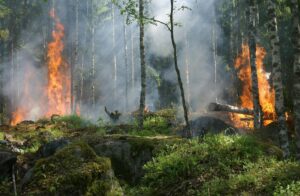A landmark study has found that human-caused climate change led to 15,000 additional deaths from wildfire air pollution in the continental United States over a 15-year period ending in 2020. The research, led by Oregon State University and published in Nature Communications Earth & Environment, is the first to quantify how many people have died as a result of climate-driven increases in wildfire-related fine particulate pollution (PM2.5).
 The study reveals that 2020 alone accounted for over a third of these deaths, during which massive wildfires burned across California, Oregon, Colorado, Arizona, and the Pacific Northwest. These fires released vast quantities of fine particulate matter—PM2.5—tiny particles that can penetrate deep into the lungs and bloodstream, causing and worsening heart and respiratory illnesses.
The study reveals that 2020 alone accounted for over a third of these deaths, during which massive wildfires burned across California, Oregon, Colorado, Arizona, and the Pacific Northwest. These fires released vast quantities of fine particulate matter—PM2.5—tiny particles that can penetrate deep into the lungs and bloodstream, causing and worsening heart and respiratory illnesses.
Between 2006 and 2020, wildfire-related PM2.5 pollution caused an estimated 164,000 deaths, of which 15,000 were directly attributed to climate change. Without global warming, the researchers estimate that total deaths would have been closer to 149,000. On average, the death rate from wildfire PM2.5 was 5.14 per 100,000 people per year, a toll roughly twice as high as the annual U.S. death rate from hurricanes.
The analysis also calculates an economic burden of $160 billion due to these climate-linked wildfire deaths. The cost includes healthcare, lost productivity, and the value of statistical life a standard measure used to estimate the monetary value of mortality risk reductions. California, Oregon, and Washington bore the highest economic and health impacts.
Using detailed climate and wildfire models, satellite data, smoke dispersion estimates, and public health data, the study draws a direct line between global warming and the growing threat of deadly air pollution from wildfires. Researchers warn that without significant efforts to reduce greenhouse gas emissions and improve land management, wildfire PM2.5 mortality is projected to increase by at least 50% by midcentury, pushing annual damages to an estimated $244 billion.
Wildfires now account for nearly half of all PM2.5 pollution in the U.S., undermining decades of progress in air quality improvements. The findings suggest that, unless aggressive climate action is taken, wildfire smoke will become one of the leading environmental threats to human health in the country.
